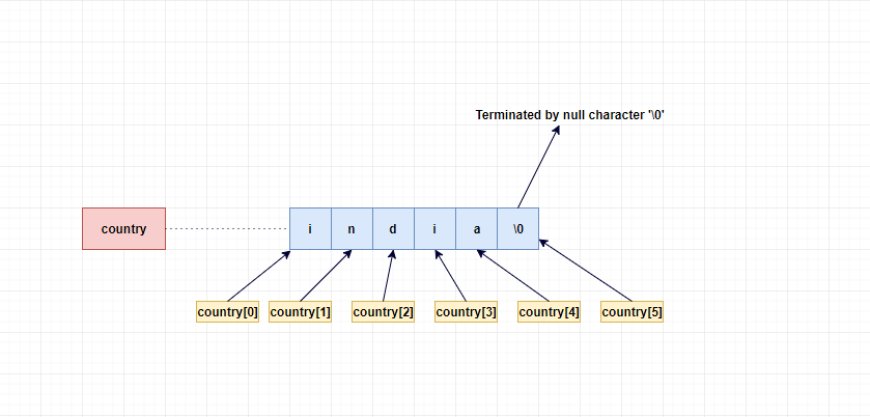String Manipulation in C
In the C programming language, strings are represented as arrays of characters terminated by a null character ('\0')

Strings are a fundamental data type in programming, used to represent sequences of characters. In the C programming language, strings are represented as arrays of characters terminated by a null character ('\0'). This tutorial will cover various string operations, including string input/output, concatenation, comparison, and manipulation.
1. Introduction to Strings
In C, strings are sequences of characters stored in an array. The last character of a string is always the null character ('\0'), which marks the end of the string.
2. String Declaration and Initialization
Strings can be declared and initialized using the following syntax:
char myString[] = "Hello, World!";
3. String Input and Output
C provides the printf() function for output and scanf() function for input. To print a string, you can use the %s format specifier:
#include
int main() {
char myString[] = "Hello, World!";
printf("String: %s\n", myString);
return 0;
}
To read a string, use the %s format specifier within scanf():
#include
int main() {
char inputString[100];
printf("Enter a string: ");
scanf("%s", inputString);
printf("You entered: %s\n", inputString);
return 0;
}
4. String Length
To find the length of a string, you can use the strlen() function from the string.h library:
#include
#include
int main() {
char myString[] = "Hello, World!";
int length = strlen(myString);
printf("Length of string: %d\n", length);
return 0;
}
5. String Concatenation
String concatenation involves combining two strings into a single string. This can be done using functions like strcat() from the string.h library or by manually iterating through the strings and copying characters.
#include
#include
int main() {
char str1[50] = "Hello, ";
char str2[] = "World!";
strcat(str1, str2);
printf("Concatenated string: %s\n", str1);
return 0;
}
6. String Comparison
String comparison is performed using functions like strcmp() from the string.h library. It returns 0 if both strings are equal.
#include
#include
int main() {
char str1[] = "apple";
char str2[] = "orange";
int result = strcmp(str1, str2);
if (result == 0) {
printf("Strings are equal.\n");
} else {
printf("Strings are not equal.\n");
}
return 0;
}
7. String Copying
To copy one string into another, you can use functions like strcpy() from the string.h library:
#include
#include
int main() {
char source[] = "Copy this.";
char destination[20];
strcpy(destination, source);
printf("Copied string: %s\n", destination);
return 0;
}
8. String Manipulation
C provides various functions for manipulating strings, such as strchr(), strstr(), strtok(), etc. These functions help in searching for characters or substrings within a string, and tokenizing strings into smaller parts.

 HSingh
HSingh